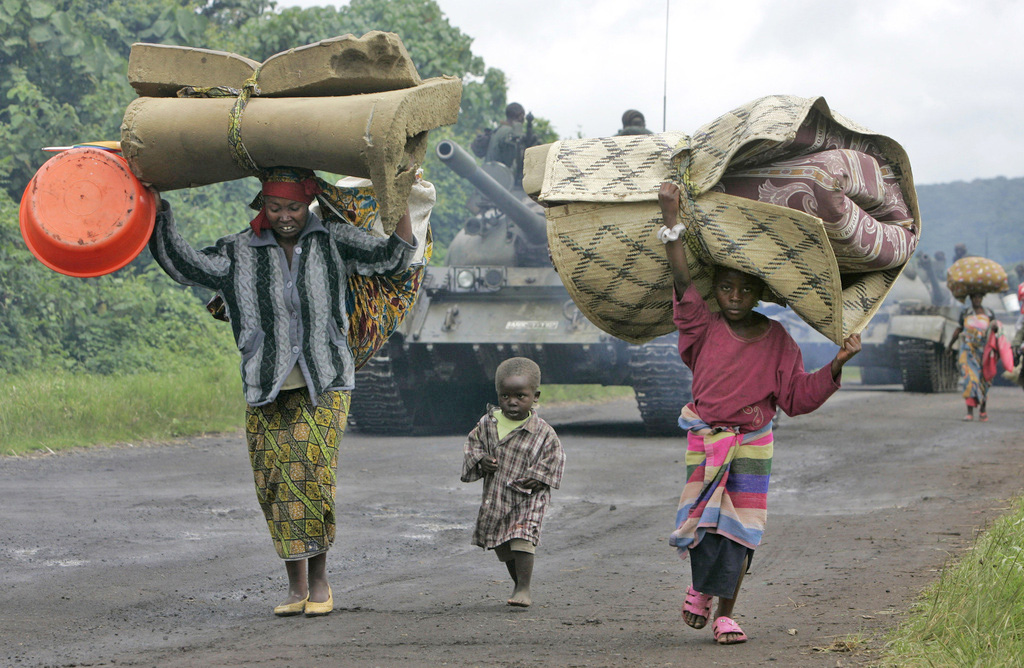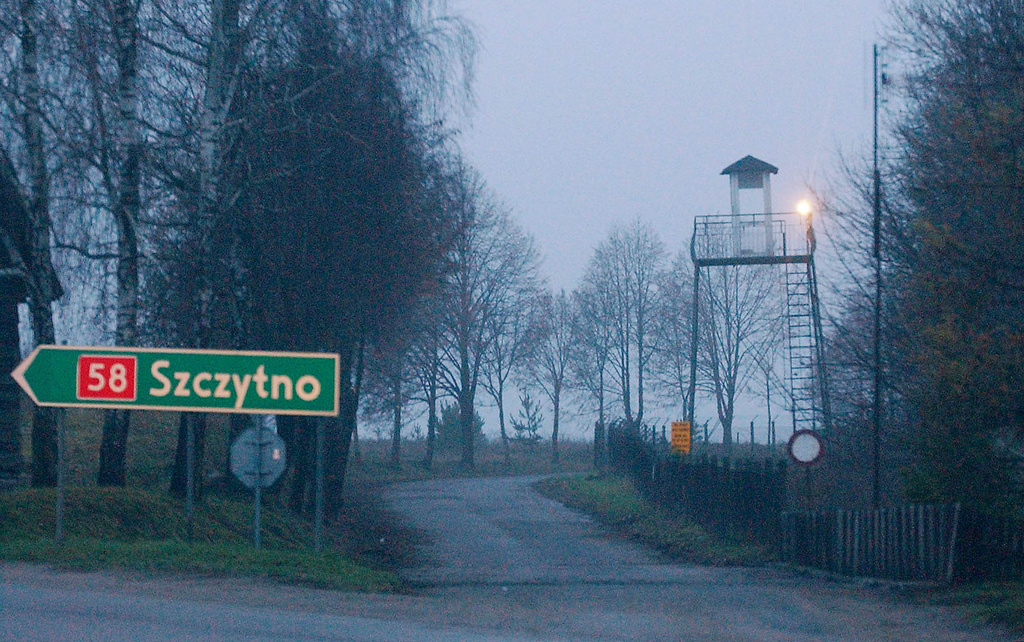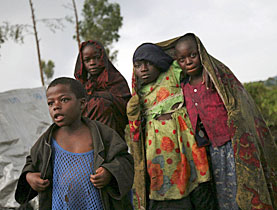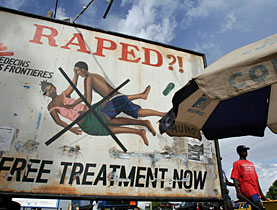Rape is still used as a weapon of war in Congo

Despite a relatively stable military situation in the Democratic Republic of Congo (DRC), rape continues to be used as a weapon against women and young girls.
Swiss senator Dick Marty and mime artist Dimitri recently returned from a visit to eastern DRC organized by the Geneva-based World Organisation against Torture (OMCT).
“We were all very shocked by what we saw and heard,” Dimitri told Infosud/swissinfo.ch by telephone.
“Devastated young women. One of them – the only survivor of a gang rape as the criminals thought she was dead – saw her torturers cut the heads and limbs off her friends. There are thousands like her who don’t dare go to the police or the courts which are corrupt.”
The Swiss mime artist travelled to the region with Marty from February 22-27 as part of a solidarity mission organized by the OMCT, in collaboration with the Swiss foreign ministry.
Dimitri and Marty are both OMCT patrons. Having witnessed what is happening in the field, it is hoped Marty will raise the issue among Swiss politicians, and Dimitri will call attention to the problem during his performances.
The two men were accompanied by Swiss filmmaker Daniel Schweizer, who recently won the Grand Prix film award at the International Film Festival and Forum on Human Rights in Geneva for his film Dirty Paradise about clandestine gold-diggers in French Guyana.
The director filmed scenes in DRC for a forthcoming short film to be released in June.
Powerlessness
Despite this “tragic vicious circle”, Dimitri said he was amazed by the commitment of the human rights activists on the ground.
“They take huge risks and are persecuted by armed groups and by the state; women are doubly exposed,” he related.
“It’s true that we all returned home with this sense of powerlessness. But the activists there kept reminding us that every single action to combat this issue outside the country – however small – is important for them.”
An alarming report presented on Wednesday to the Geneva-based United Nations Human Rights Council by seven UN specialists underlines the serious problems in eastern DRC.
“Members of the Armed Forces of the Democratic Republic of Congo (FARDC), the National Congolese Police (PNC), the National Intelligence Agency (ANR) and other intelligence forces have been reported as being responsible for summary executions, sexual violence, torture and ill-treatment.”
Armed groups such as the Lord’s Resistance Army (LRA) and the Democratic Forces for the Liberation of Rwanda (FDLR) commit atrocities that amount to grave breaches of international humanitarian law and, in some instances, may also constitute crimes against humanity… in the context of the military operations against FDLR, brutal sexual violence has been used as a weapon of war by all local parties to the conflict,” it states.
High price
“We are paying a very high price for stability in DRC,” said Delly Mawazo Sesete, Director of the Centre for Research into the Environment, Democracy and Human Rights (CREDDHO) in Goma. He was invited to Geneva last week by OMCT.
“There is complete impunity, as no one wants to touch the alliances that have been built to ensure peace. Militias that committed the worst crimes are integrated into the army. And when we demand that these people are not allowed to join the army and are judged for their crimes, we are accused of not wanting peace.”
Julienne Lusenge, president of the Congolese organisation, Solidarity of Women for People and Integrated Development (SOFEPADI), underlined the difficulties for human rights defenders.
In 2009 her NGO reported 148 cases of women who had been raped to the prosecuting authorities and obtained 76 judgements.
“But only 14 people are behind bars. No sooner have they been sentenced than these criminals leave prison and attack victims and human rights activists,” she said.
“Many women have been raped again for having dared taken them to court. As for the activists, some have been attacked by machete or shot, while others have lost their children. I’ve had to move three times with my entire family.”
Lusenge deplores the lack of commitment by the authorities: “Our laws are very good but they are not being applied. Only one per cent of the national budget is devoted to justice, which is also corrupt. During a trial we have to pay our own transport costs for the victims, lawyers and sometimes even for the accused.”
During the first nine months of 2009, the UN Population Fund reported 7,500 cases of sexual violence in North and South Kivu in eastern DRC.
“But this is only the tip of the iceberg,” said Lusenge.
According to her information, there are 12,500 cases in North Kivu alone.
“Most don’t dare admit what happed to them as they are then rejected by their community. There is no care for children resulting from these rapes, or for the mothers. And the victims must continue to live alongside their torturers who are not at all troubled.”
Carole Vann/InfoSud, swissinfo.ch
A five-year war in DRC officially ended in 2003 but violence lingers on. Millions have died and tens of thousands of women and young girls have been raped.
The mineral-rich African state is regularly listed as one of the world’s worst humanitarian disasters.
On March 11 the DRC called for all UN troops to pull out in 2011, a move which human rights groups say would spell disaster for civilians caught up in conflict there.
The UN, which has 16,500 peacekeepers in the DRC, says it is ready to start withdrawing its forces in June 2010 from Kasai and Katanga provinces. The areas were once on the front lines of a 1999-2002 war which split the country into rival fiefdoms. They have been relatively calm for years. But the UN says forces will still be needed to back ongoing Congolese military operations against Rwandan Hutu rebels in the east and in the north against the Uganda-based Lord’s Resistance Army.
Human rights groups say massacres, rape, looting and other attacks on civilians continue in the east, and that armed ex-rebel groups control artisanal mining of lucrative tin and tantalum, used in telephones and camera lenses. Lobby group Global Witness said recently a UN pull-out should be conditional on de-militarisation of these mines.
“Alarming levels of violence against women continue to be reported across the country, particularly in the east, as part of a broader pattern of violence and discrimination against women and girls. As reflected in the experts’ initial report, forms and manifestations of violence endured by women and girls in conflict and “peace” situations are manifold.”
“While most instances of violence, in particular sexual violence, are committed by various armed actors, many cases are nevertheless reportedly perpetrated by civilians, both in zones affected by conflict and other parts of the country.”
“In an increasingly militarized society, impunity, absence of the rule of law and women’s subordinate social and legal position reinforces a climate of general acceptance and tolerance for violence against women and girls.”

In compliance with the JTI standards
More: SWI swissinfo.ch certified by the Journalism Trust Initiative












You can find an overview of ongoing debates with our journalists here . Please join us!
If you want to start a conversation about a topic raised in this article or want to report factual errors, email us at english@swissinfo.ch.